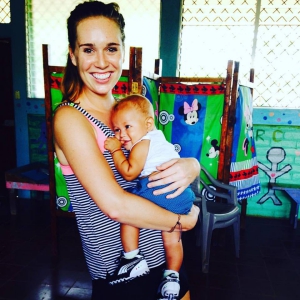
Did YOU study / intern / volunteer abroad?! If so, where and what inspired you to go?
I studied abroad spring semester of my junior year of college, from January to June 2011, in Alcalá de Henares and Madrid, Spain. I was lucky enough to be part of a dual abroad program that combined two colleges, my own, Skidmore College, and Tufts University. This program was rich in integrating students into the language and culture of Spanish society as well as providing us with immense art and travel experiences through weekly museum visits and monthly excursions to different cities and towns in Spain. I choose this program for its host family component and strong dedication to language assimilation. The semester combination of academia and travel was so fulfilling. Likewise, it was thrilling to live six months in Europe and easily travel to so many different countries. During my semester abroad I visited France, Portugal, Italy, Greece and Bulgaria which ignited and furthered my addiction to travel.
What about the future of the industry? How do you think study or intern abroad and international education will change over the next 10 years?
While working in Nicaragua, I met two students who I thought were working internationally post-college, as I was, on account of their maturity and independence. I was surprised then, to find out that they were 19 years-old and were completing a gap year before attending college. I thought this was wonderful and wished that I had considered it when I was 18! International travel makes one more self-aware and changes one’s perspective about life and success. Acquisition of a foreign language and assimilation into a different culture greatly influences character in ways that prove beneficial in all future endeavors. Getting to see other countries and learn on a first-hand basis helps individuals make more informed decisions about future career and academic paths. I believe (and hope) that within the next 10 years, international education will be a more standard and highly encouraged component of secondary and university programs.
Why is language learning and cultural immersion important to you?
Cultural immersion comes through communication, which can only be obtained through language assimilation. Thus, learning a foreign language opens the door to understanding others, which is critical in terms of world policy and health, as well as something as fundamental as a friendship between people from different nations. One becomes more open-minded and more compassionate when learning the language and ways of life of others, since language assimilation is such a humbling experience. While living abroad I have come to love parts of the cultures in which I was immersed, and though different from US customs, I have adopted them and incorporated them into my own life. Through learning Spanish, I have gained confidence in my abilities to communicate with so many more people around the world and, more importantly, provide adequate translation in a medical setting, which is of up most importance for patients as well as healthcare providers.
How have you changed/grown since working for your current company?
Working for FIMRC in rural Nicaragua has had a profound impact on my life and my character. I’ve become more confident and self-aware through having learned most things the “hard way” and having to convey what I needed without knowing the Spanish words, like “toilet paper” for example, in moments of crisis! I’ve learned to live with less and have acquired a new-found perspective on what should be valued in life and the importance of achieving happiness and success based on one’s own standards. I have gained appreciable patience while working in Nicaragua and feel confident in my abilities to work independently. Some of my greatest challenges have occurred in this job setting, thus, to have overcome them has proven incredibly fulfilling. Contrarily, some of my fondest moments have occurred at FIMRC, and for that I will be forever grateful.
Describe a time when you felt especially proud to be part of your current team.
Our FIMRC site partnered with a photo journalist to showcase our Women’s Health program, as a means to raise funds for a new OB/GYN consult room. As the photographer took photos of the women, I asked each of them to comment on FIMRC’s work in the community and express their thoughts on our programs. Their answers were touching: some women told me that it “was a blessing that FIMRC founded a site in their community.” Others said that they “are so lucky to have professional services at such fair costs and they they hope we never leave.” Many women hugged me after talking. I was moved by their appreciation for our services and felt so proud to be a member of our incredible team.
















